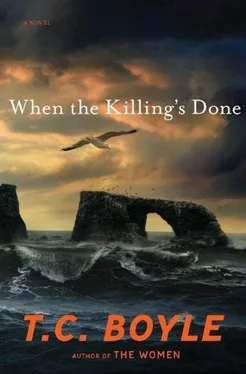When she woke it was to the sun and the beach that had grown marginally bigger, a scallop of blackly glistening sand emerging from the receding tide, the teeth of the rocks exposed now and the wet gums clamped beneath them. She’d been in the shadows all this time, huddled on her perch, tucked away from the tidal wash and the sun too, but now the sun had moved out into the channel and the heat of it touched her and roused her. For a long while she sat there, absorbing the warmth, and if she was sunburned it didn’t matter a whit because she’d rather be burned than frozen, burned anytime, scorched and roasted till she peeled, because anything was better than the cold locked up inside her, a numbness so deeply immured in her she might as well have been a corpse. She gazed out on the sea with a kind of hatred she’d never known, hating the monotony of it, the indifference, the marrow-draining chill. And then, abruptly, she was thirsty. Still thirsty. Thirstier than she’d been out there on the sea when she was thirstier than she’d ever been in her life.
In that moment her eye jumped to the gleam of metal at the near end of the cove. The ice chest. There it was, upright in the sand, its lid still fastened. She sprang down from the rock, slimed and filthy, her limbs battered and her tongue made of felt, and ran to it, threw open the lid and saw that the ice was gone and the bottles smashed — all but one, the precious last remaining dark brown sweating bottle with the label soaked off and sand worked up under the cap. Lifting the beer to the sun, she could see that it was intact, its bubbles infused with light and rising in a slow hypnotic dance. Beer. Cold beer . But she had no opener, no churchkey, no knife or screwdriver or tool of any kind. And where was Till? Where was he when she needed him?
She remembered how casually he would slam the neck of his beer against the edge of the counter or the workbench in the garage and how instantly the cap would fly up and away and the cold aperture of the bottle would come to his lips, all in a single fluid motion, as if the opening and the draining of the bottle constituted the same continuous physical process. Overhead, chased on a draft, a gull appraised her, mewed over her torn and abraded flesh, and was gone. She looked wildly around her for something, anything, to make a tool of, but there was nothing but sand and driftwood and rock.
Rock. Rock would do it. Of course it would. And then she was smoothing her hand over the wall of the overhang, feeling for a rough spot, a ledge, any kind of projection, and here, here it was, the cap poised just so and the weight of her burned hand coming down on it, once, twice. . and nothing. She worked at it, frantic now, angry, furious, but the best she could do was flatten the ridges till the cap was even more secure than when she’d begun, and it was too much, she couldn’t take a single second more of this — and then it was done, the neck shattered and gaping and she draining the whole thing in three airless gulps and if there was glass in it and if the glass cut her open from esophagus to gut she didn’t give a damn because she was drinking and that was the only thing that mattered.
But the beer was gone and the thirst was there still, rattling inside her like a field of cane in a desert wind, and was it any surprise she was light-headed? She’d always been a capable drinker, proud of her ability to match Till beer for beer, but this one hit her hard and before she knew it she was down in the sand, sitting there cross-legged like a statue of the Buddha, as if that was what she’d meant to do all along. The sun seemed to have shifted somehow in the interval, dropping down close to the flattening gray surface of the sea where the fog could take hold of it and snuff it out like the burned-up butt of the cigarette she suddenly wanted as much as she wanted water. She stood shakily and went to the ice chest. It was right where she’d left it not ten minutes ago (or had it been longer? Had she dozed off?), but now the incoming tide was running up the beach to take it from her all over again. Seizing it by one corner, she dragged it awkwardly across the sand to the declivity beneath the overhang, then worked it up to her perch six feet above the beach. Inside, amidst the litter of broken bottles and stripes of sand and weed, there was a liquid that might have been a mix of beer and meltwater, that might have been potable, that might have quenched her thirst, but when she thrust a finger into it and licked that finger all she could taste was salt.
Dusk fell, aided and abetted by the fog, which closed off the beach even as the tide ran in, and though the water was up past her knees, she probed the scalloped ledges at both ends of the cove, looking for a way out. She braced herself, one foot up, then the other, straining for a handhold. Working patiently, her face pressed to the rock, she got as high as fifteen or twenty feet above the beach, but after she fell for the third time, coming down hard amidst the stones and the cold shock of the water, she gave up. It was no use. She was trapped. A single pulse of panic flickered through her, but she suppressed it. She wasn’t afraid, not anymore — that was behind her. All she felt was frustration. Anger. Why had she been spared only to wash up here to die of thirst, hunger, cold? Where was God’s hand in that? Where was His purpose? Finally, when it was fully dark and the fog settled in so impenetrably as to close off even the stars, let alone the running lights of any boat that might have been plying the channel looking for them, for survivors — and here she saw Till and Warren, wrapped in blankets in a gently rocking cabin, the glow of the varnished wood, lanterns a-sway, mugs of hot coffee pressed to their lips — she held fast to the ice chest and willed herself asleep.
In the morning, at first light, there was the sound of the gulls that was like the opening and closing of a door on balky hinges, but there was no door here, no bed or room or clothes or warmth, and she couldn’t see the gulls for the fog. She shivered into the light, slapping at her thighs and shoulders and huddling in the cradle of her arms, and then the thirst took hold of her. It roused her and she rose to her feet, fighting for balance, the tide having receded and risen all over again, reducing her world to this rock and the wall above her. She wanted a pitcher of water, that was all, envisioning the white bone china pitcher in the kitchen at home, a hand-me-down from her mother she brought out for special occasions, and it took her a long moment to realize that there was a persistent cold drip tapping at her shoulder and that she’d been shifting unconsciously to avoid it. She lifted her face and saw that the cliff was wet, the fog whispering across the rock above her, condensing there, dripping, dripping.
What she didn’t know was that forty years earlier a man named H. Bay Webster had leased the island from the federal government for the purpose of raising sheep, but the sheep had failed to thrive because of overgrazing and lack of water, and finally, in their distress, they had been reduced to licking the dew each from another’s fleece in order to survive. Not that it mattered. All that mattered was this drip. She held her tongue out to it, licked the rock as if it were a snow-cone presented to her by the lady behind the concession stand at the county fair. And when one of the little green shore crabs came within reach, a flattened thing, no more than two inches across, she crushed it beneath her foot and then fed the salty cold wet fragments into her mouth.
It took her a long while after that to get her courage up, because she knew now what she had to do though her whole being revolted against it. She kept praying that someone would come for her, that the prow of a ship would ease out of the fog or a rope come hurtling down from above, anything to spare her getting back into that killing water. The funny thing was that she’d always liked swimming — she’d joined the swim team in school and trained so relentlessly her hair never seemed to be really dry her whole senior year — but now, as she climbed down from the rock, clutched the ice chest to her and fought through the surf, she hated it more than anything in the world. Instantly, she was cold through to the bone and thrashing for warmth, then she was fighting past the breakers and out into the sea.
Читать дальше












